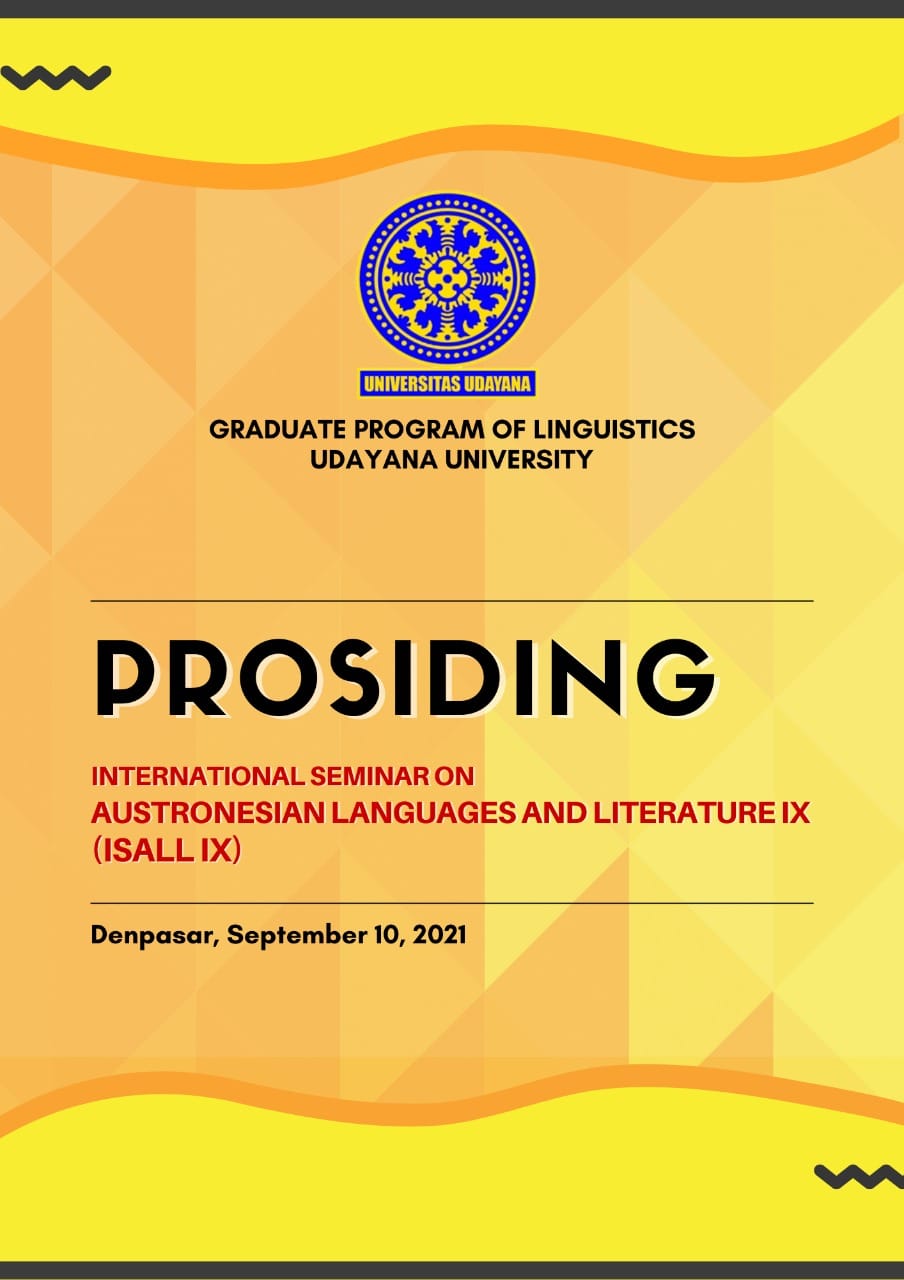The lexicalisation of HAPPINESS in the Malayic varieties of Indonesia
Abstract
This paper explores the lexicalisation of HAPPINESS in the Malayic varieties spoken in the Indonesian archipelago. We specifically investigate (i) the inventory of lexical forms, and the conceptual categories they encode, that refer to the generic concept of HAPPINESS in English, and (ii) how they vary along the quantitative and sociolinguistic dimensions, particularly the regional variation. Our study reveals that HAPPINESS is strongly lexicalised by forms referring to SENANG overall. In addition to this general trend, we also demonstrated that the lexicalisation of HAPPINESS concept can vary, both qualitatively and quantitatively, across the region at a more generic, concept level, and a more specific level of morph types
References
Brinton, L. J., & Traugott, E. C. (2005). Lexicalization and language change. Cambridge University Press.
Geeraerts, D. (2006). Methodology in Cognitive Linguistics. In G. Kristiansen, M. Achard, R. Dirven, & F. J. Ruiz de Mendoza Ibáñez (Eds.), Cognitive linguistics: Current applications and future perspectives (pp. 21–49). Mouton de Gruyter.
Gil, D., Tadmor, U., Bowden, J., & Taylor, B. (2015). Data from the Jakarta Field Station, Department of Linguistics, Max Planck Institute for Evolutionary Anthropology, 1999-2015. https://lingweb.eva.mpg.de/archive/jakarta/data.php.html
Gries, S. Th. (2013). Statistics for linguistics with R: A practical introduction (Second). Mouton de Gruyter.
Grondelaers, S., Speelman, D., & Geeraerts, D. (2007). Lexical variation and change. In D. Geeraerts & H. Cuyckens (Eds.), The Oxford Handbook of Cognitive Linguistics (pp. 988–1011). Oxford University Press.
Hilpert, M. (2019). Lexicalization in Morphology. In Oxford Research Encyclopedia of Linguistics. Oxford University Press. https://doi.org/10.1093/acrefore/9780199384655.013.622
Jezek, E. (2016). The lexicon: An introduction. Oxford University Press.
R Core Team. (2021). R: A language and environment for statistical computing. R Foundation for Statistical Computing. https://www.R-project.org/
Rajeg, G. P. W. (2019). Metaphorical profiles and near-synonyms: A corpus-based study of Indonesian words for HAPPINESS [PhD Thesis, Monash University, Australia]. https://doi.org/10.26180/5cac231a97fb1
Rajeg, G. P. W. (2020). Linguistik korpus kuantitatif dan kajian semantik leksikal sinonim emosi bahasa Indonesia. Linguistik Indonesia, 38(2), 123–150. https://doi.org/10.26499/li.v38i2.155
Rajeg, G. P. W., & Rajeg, I. M. (2021). Supplementary materials for The Lexicalisation of HAPPINESS in the Malayic Varieties of Indonesia. Open Science Framework (OSF). https://doi.org/10.17605/OSF.IO/Y42F6. https://github.com/gederajeg/malayic-happiness
Shaver, P. R., Murdaya, U., & Fraley, R. C. (2001). Structure of the Indonesian emotion lexicon. Asian Journal of Social Psychology, 4(3), 201–224. https://doi.org/10.1111/1467-839X.00086
Trask, R. L. (1997). A Student’s Dictionary of Language and Linguistics. Arnold ; Distributed by St. Martin’s Press.
Geeraerts, D. (2006). Methodology in Cognitive Linguistics. In G. Kristiansen, M. Achard, R. Dirven, & F. J. Ruiz de Mendoza Ibáñez (Eds.), Cognitive linguistics: Current applications and future perspectives (pp. 21–49). Mouton de Gruyter.
Gil, D., Tadmor, U., Bowden, J., & Taylor, B. (2015). Data from the Jakarta Field Station, Department of Linguistics, Max Planck Institute for Evolutionary Anthropology, 1999-2015. https://lingweb.eva.mpg.de/archive/jakarta/data.php.html
Gries, S. Th. (2013). Statistics for linguistics with R: A practical introduction (Second). Mouton de Gruyter.
Grondelaers, S., Speelman, D., & Geeraerts, D. (2007). Lexical variation and change. In D. Geeraerts & H. Cuyckens (Eds.), The Oxford Handbook of Cognitive Linguistics (pp. 988–1011). Oxford University Press.
Hilpert, M. (2019). Lexicalization in Morphology. In Oxford Research Encyclopedia of Linguistics. Oxford University Press. https://doi.org/10.1093/acrefore/9780199384655.013.622
Jezek, E. (2016). The lexicon: An introduction. Oxford University Press.
R Core Team. (2021). R: A language and environment for statistical computing. R Foundation for Statistical Computing. https://www.R-project.org/
Rajeg, G. P. W. (2019). Metaphorical profiles and near-synonyms: A corpus-based study of Indonesian words for HAPPINESS [PhD Thesis, Monash University, Australia]. https://doi.org/10.26180/5cac231a97fb1
Rajeg, G. P. W. (2020). Linguistik korpus kuantitatif dan kajian semantik leksikal sinonim emosi bahasa Indonesia. Linguistik Indonesia, 38(2), 123–150. https://doi.org/10.26499/li.v38i2.155
Rajeg, G. P. W., & Rajeg, I. M. (2021). Supplementary materials for The Lexicalisation of HAPPINESS in the Malayic Varieties of Indonesia. Open Science Framework (OSF). https://doi.org/10.17605/OSF.IO/Y42F6. https://github.com/gederajeg/malayic-happiness
Shaver, P. R., Murdaya, U., & Fraley, R. C. (2001). Structure of the Indonesian emotion lexicon. Asian Journal of Social Psychology, 4(3), 201–224. https://doi.org/10.1111/1467-839X.00086
Trask, R. L. (1997). A Student’s Dictionary of Language and Linguistics. Arnold ; Distributed by St. Martin’s Press.
Published
2021-11-18
How to Cite
PRIMAHADI WIJAYA RAJEG, Gede; RAJEG, I Made.
The lexicalisation of HAPPINESS in the Malayic varieties of Indonesia.
International Seminar on Austronesian Languages and Literature, [S.l.], v. 9, n. 1, p. 44-51, nov. 2021.
Available at: <https://ojs.unud.ac.id/index.php/isall/article/view/79856>. Date accessed: 20 feb. 2026.


